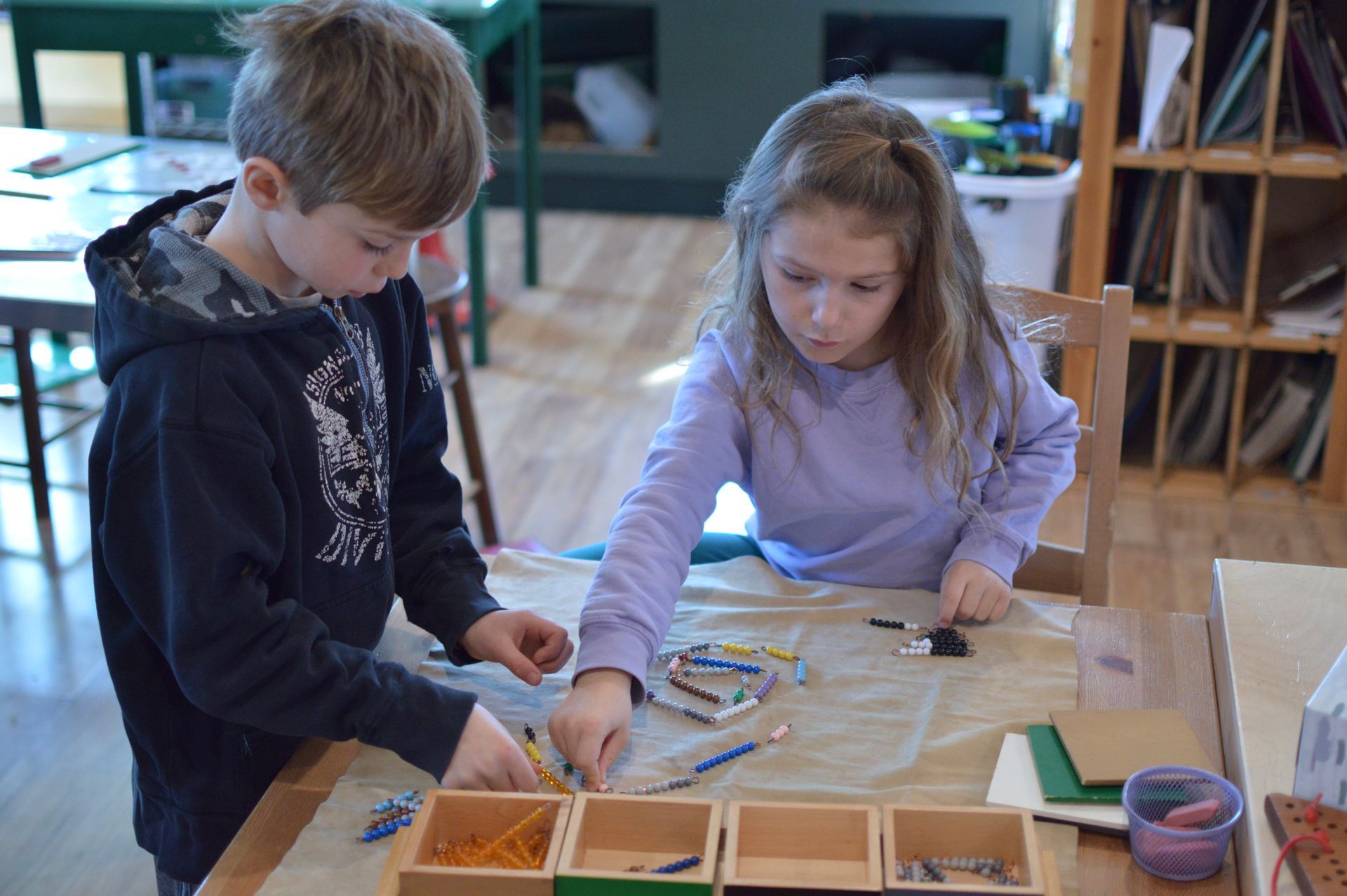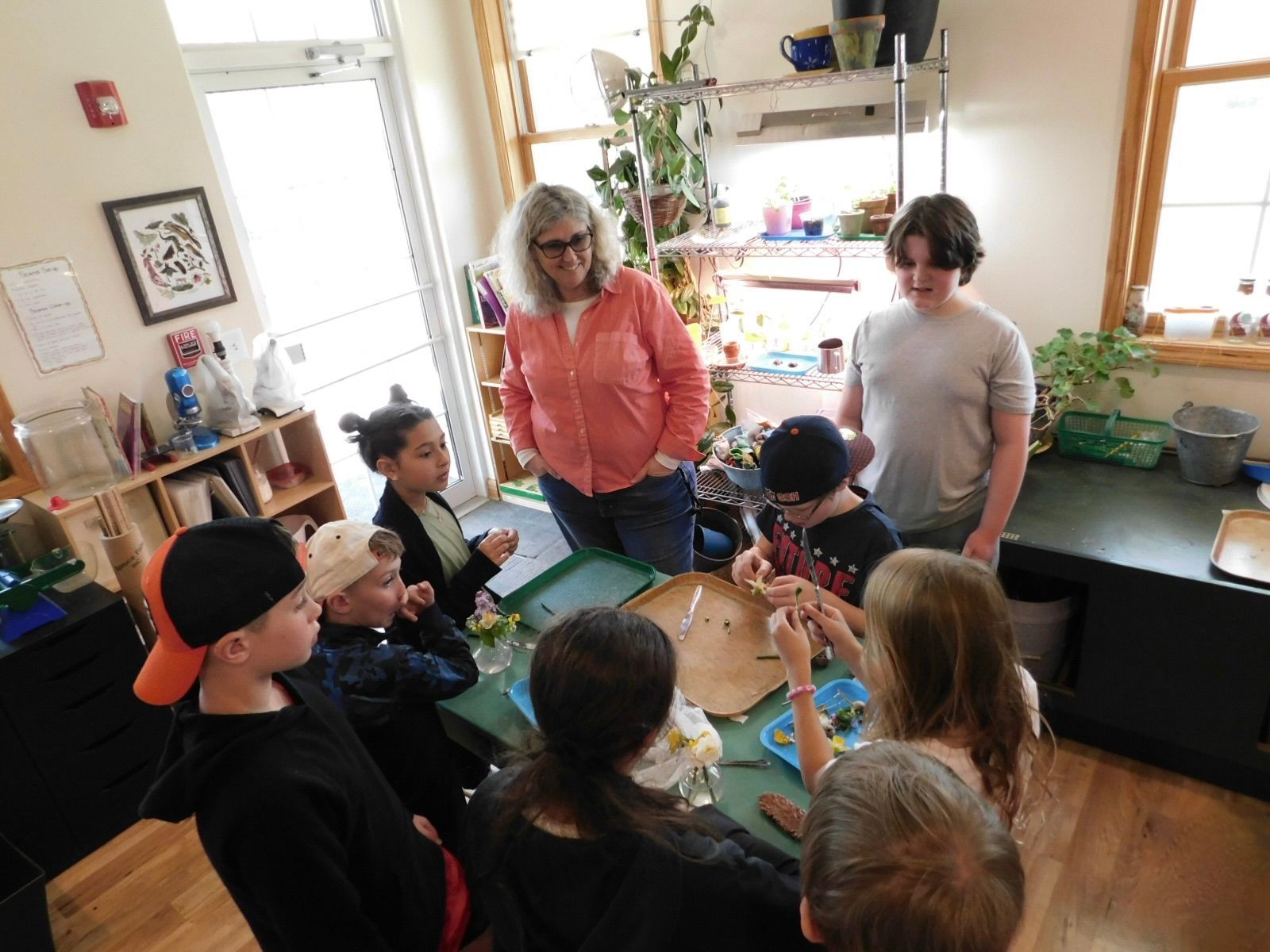Elementary
6-12 years old (First-Sixth Grades)
8:00-8:30 Arrival
3:30 Dismissal
The Elementary program offers your child an unparalleled opportunity for growth in this new period of life. Your imaginative, social and creative child needs an environment with appropriate freedom and limitations, with an expansive curriculum to support their curiosity and prepare them for the challenges of the future.
Our elementary program serves students ages 6-12 — from first to sixth grades. Lessons in the elementary classes are always given in small groups giving each student ample opportunity to express interests, ask questions, and make meaningful contributions. The student-teacher relationships that develop over the six years they spend together allow for the unique role of teacher as mentor to impact students in unparalleled ways. The teachers are continuously assessing whether a student understands a concept or needs further instruction. They also help students realize their individual interests, recognize and apply their strengths, and overcome more challenging content or tasks.
The mixed-age classrooms allow students opportunities to “practice life.” They start out as the youngest, and work their way to become the oldest, the role models and mentors admired by their younger peers. The teacher is not the only one giving lessons or the only one managing the class. The classroom is filled with little teachers, each student realizing over time what he or she will contribute to the success of the classroom.
It is this unique experience that helps P.P.M.A. students develop into remarkable students, citizens and leaders. Whether it is teaching a friend how to find the square root of 64, organizing and planning a field trip on their own, or mediating a disagreement between friends, P.P.M.A. students thrive.
Learning without limits
Your child will study both broadly and deeply, covering many subjects not attempted in conventional schools. Because there is not a rigid schedule or prescribed curriculum that the whole class must follow, your child can focus intensely on her self-chosen work, with minimal interruption. At the same time, she will collaborate with the teacher to ensure that the work is challenging and purposeful – and that basic standards are met. In that way, the teacher is in charge of the minimum scope of work – your child is in charge of the maximum.
The teacher is an "Enlightened Generalist"
Our AMS-credentialed Montessori teachers don’t have a specific area of expertise and we don’t have “specialist” teachers for subjects like art, P.E., or music. Instead, our teachers have a broad knowledge of all subject areas – more than enough to help your child discover interests in any area imaginable and challenge them to deepen their field of study through research. Instead of giving the right answers, the teacher will ask your child the right questions to inspire them to find the answers for themself.
The format mirrors your child's developmental needs
Your elementary-age child has a strong drive for social connection. They are starting to develop deeper friendships and a connection to the community around them. Why then, would we want them to learn in rows of desks, confined to a chair, while the teacher lectures the class as a group? Instead, we embrace your child’s natural need for social exploration by giving lessons in small groups and encouraging children to work with a variety of others on follow-up projects and research into subjects of intense interest. In a Montessori elementary program, children help children before adults help children, resulting in teamwork, independence, and a true learning community.
Engagement is essential
Real learning occurs when children are engaged – not when the teacher makes a blanket assignment. Curiosity is championed in our elementary classroom, and your child is encouraged to explore concepts to a level of detail only limited by his or her imagination.
Learning occurs beyond the classroom
We want the children to be comfortable navigating the world, not just our classroom. So, we have a few excellent books, but not everything there is to read about a topic. As a result, the children must ‘go out’ beyond the limits of the classroom to find the information or resource that they need.
A "Going Out Trip" is a planned undertaking by a small group of children. They find a resource in the community, schedule the outing, arrange for their own transportation and supervision (by staff or parent volunteers), prepare themselves for the experience and conduct themselves with dignity while out in public. Each Going Out is an entire course of study on independence, responsibility and good citizenship.
Developing flexibility, resilience and grit
We believe children learn to be adaptable by supporting them to solve their own problems, rather than solving problems for them. With the help of a supportive adult, your child can, most often, find the solution that is best for him.
Learning in context for deeper understanding
Unlike in a conventional program with a separate time of the day for each subject, your child will gain a much deeper understanding of concepts by learning in context. The starting point for all courses of study is the “Great Lessons;” these impressionistic and scientific stories give your child the “big picture” of astronomy, earth science, geography, physics, biology, history, anthropology, cultural and social studies, language, math, music and art. Meaningful learning happens when children understand the “why” as much as the “what” – and are inspired to learn even more on their own.
Learning as its own reward
We have high expectations for your child and believe that rewards and punishments appeal to the lowest levels of individuals’ intellect. Given a sticker, children will do their best for a few minutes. Given experiences that help them to believe in themselves and their abilities, they will do their very best for a lifetime.
A learning environment that nurtures your child's curiosity
Consider when you do your best work—it's likely when you're free from interruptions and external pressures. The same principle applies to your child. Our school embraces this by offering long, open-ended work periods that honor each child’s natural curiosity and concentration.
In our classrooms, children have the freedom to choose their activities, whether independently or in groups, allowing them to explore concepts introduced in lessons at their own pace. The flexibility to move around the classroom fosters a dynamic learning environment where ideas can spread organically. This way, children are inspired not only by the lessons but also by interacting with their peers.
By providing a setting that supports uninterrupted exploration, we create a space where your child can thrive academically and socially.
Prepared and confident
The ultimate goal of the elementary program is to develop students’ abilities and self-confidence so that they are able to take charge of their own learning. Students who have gained an appreciation for the enormous scale and resources of the world through the elementary curriculum are ready to explore their place within that world upon entering middle school.
Peaceful Pathways Montessori has become a part of our family. Because our children spend several years with the same teacher, that teacher gets to know them, know how they learn, and what they need extra assistance with. Everyone knows our children's passions and has found creative ways to utilize those passions to harvest learning. They are not just learning a subject, they are doing practical and physical work that instills the necessary lessons they need for their education. It truly is a unique education.






